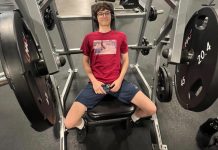By Oliver Van Aken

“Welcome Back, this is going to be a FUN and EXCITING year, lots of things will change from years past, so take your vitamins and get plenty of rest and hold on,” is what’s boldly stated at the top of Mr. Manning’s teacher website. Right above, is a picture of the school’s garden that his students enjoyed tending to when they could still go to school in-person. However, due to the spread of COVID-19 and Clark County School District’s (CCSD) transformation to online school, it’s not just the lack of a garden and the physical presence of their beloved teachers that has affected Life Skills, previously referred to as Special Education, students this year.
“The biggest thing I miss from in-person school are my friends,” Life Skills student Daniel Cabanlong said. “I hope they are all doing well in online school.”
Digital learning has already created many difficulties and problems for general students, not to mention the obstacles it creates for students who already have difficulties learning. Life Skills teachers have reported that both students’ and teachers’ inability to work with the necessary technology for education presents problems. It is also harder to get everyone focused and on the same page since there is a lack of structure and no physical supervision, an issue that some general students have as well.
Physical problems are not the only thing troubling Life Skills students this year. When in school, the students could socialize with their classmates, peers and teachers, but now they are mostly limited to close family and friends.General students typically have a greater ability to socialize independently; some upperclassmen can even just drive to see their friends. The amount of social interaction Life Skills students receive during online classes is not comparable to what they received when in-person. Life Skills teachers have encouraged virtual socialization through unique events. Mr. Manning tries to make each Friday a “funday”; some previous Funday activities have included virtual farmers markets and the Coronado Iheart Music Festival. The virtual farmers markets are when Mr. Manning attends the Henderson Farmers Market and buys then transports produce to his students homes, reminding them of the vegetables and fruits they used to grow at school. Life Skills students also got to attend the first ever Coronado iHeart Music Festival, where all students would contribute their favorite songs from varying artists and then listen to them. It’s a great way for the students to enjoy their favorites or discover new music that their classmates enjoy.
“My students are doing surprisingly well at adhering to their schedules,” Life Skills teacher Mr. Manning said. “The biggest challenge is the parents changing their routine to help the students.”
Most students’ classes this year start at 8:00 a.m. and end at 2:10 p.m. General students also alternate between 1st, 3rd, and 5th period classes and 2nd, 4th, and 6th period classes every other day. Life Skills students, similar to the rest of their peers, start off their day at 8:00 a.m. on call with their teachers, and as the day progresses, they attend all their classes that they normally would as if they were in-person. They remain under the supervision of one sole teacher instead of commuting to six different teachers. Also, the students courses are modified curriculum classes that help enable the students to earn their credit criteria of 22.5 for graduation.
In the end, the switch from in-person to online schooling has left notable impressions on all aspects of education this year. From technological problems to mental ones, this new normal just reaffirms the need for kindness, especially to students who are having more difficulties than the others.
“I have no idea if we will be returning to in-person school this year,” Mr. Manning said. “But I would be willing to go back if the students are allowed.”











